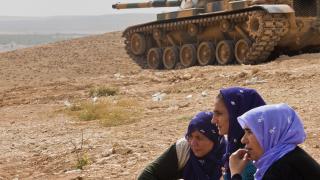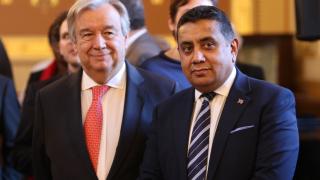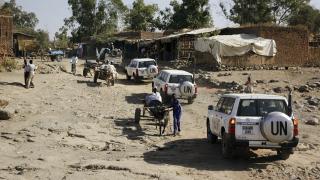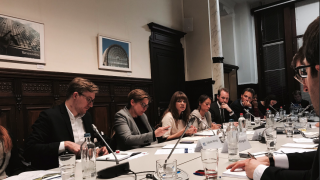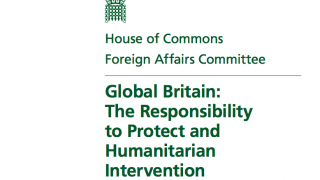
The Foreign Affairs Select Committee (FAC) today released their report on the Responsibility to Protect and Humanitarian Intervention. We were delighted to see that the report has backed our longstanding call for the UK to establish a cross-government atrocity prevention strategy.
The report comes at a time when intensive strikes by Russian and Syrian jets in Idlib (Syria) have resumed, and shortly after the UN’s Fact-Finding Mission to Myanmar called for top military officials to be investigated for genocide.
As part of the parliamentary inquiry, we submitted two sets of evidence which have been cited in the report and also inspired questions in the oral evidence sessions the committee held. We were pleased to see that the report paid attention to our evidence on the importance of non-military coercive measures (such as sanctions) as part of a broader atrocity prevention toolkit. We also welcome that the report highlights the evidence we gave on the need to avoid creating a "hierarchy of atrocities" and to treat chemical and conventional atrocity crimes with comparable gravity.
The Committee has called for the Government to produce an atrocity prevention strategy plan, ready for consultation by April 2019, after it concluded that there had been a “manifest failure to protect civilians and to prevent mass atrocity crimes in Syria”.
The current absence of such an atrocity prevention strategy has led to allegations of selectivity and a sense that the UK pursues atrocity prevention when it aligns with strategic priorities but is not itself a priority. The lack of a comprehensive strategy has also given rise to actions that have on occasion been inconsistent - or in direct contradiction to - the UK's commitments to human rights, atrocity prevention and policies on development and arms sales. The UK's response to the critical situation in Yemen, through its material support for Saudi Arabia, has raised questions of complicity in the face of alleged war crimes. The report demands the government "strengthen its stance on the use of explosive weapons in populated areas" - we would like to see this enacted in the form of a greater commitment to the Arms Trade Treaty (ATT)'s requirements to prevent arms sales from contributing to human rights violations in Yemen. In Myanmar meanwhile, the UK Government's response has been insufficient; as a previous report by the same committee highlighted, it has failed to respond decisively and appropriately to the Rohingya crisis.
The absence of such a strategy also manifests in the lack of clarity displayed by elements of the government in differentiating between conflict prevention and atrocity prevention. As part of the inquiry, FCO officials argued that atrocity prevention already exists in Government policy through its work on conflict prevention and development. This approach risks overlooking the distinct characteristics of atrocity crimes. Conflict prevention and atrocity prevention are similar and mutually supportive but not synonymous approaches; atrocity crimes are not an inevitable feature of conflict but the prevention of atrocities within conflict does require specific actions to that end. UNA-UK and civil society colleagues have therefore long called for a cross-government, comprehensive strategy for the prevention of atrocities that is a separate to parallel activity aimed at resolving conflict.
It was therefore heartening to see the report back this recommendation, and we look forward to helping the FCO develop such a strategy. To be effective such an approach should feature ministerial oversight and backing - we have proposed a named ministerial lead and a “Joint Unit” (between the Foreign and Commonwealth Office and the Department for International Development) which would enhance government capacity for early warning and develop the UK response.
We were also pleased to see the report support the idea of veto restraint, something we have also called for. The report calls for support for the French proposal on veto restraint - the UK had previously supported the alternative Accountability, Coherence and Transparency (ACT) group proposal, although the then Foreign Secretary Boris Johnson, did indicate some support for the French proposal in October 2016. Given the need to determine how the French proposal could be operationalised while protecting the role of the UN Secretary-General, the UK could usefully work with France to refine and develop this proposal and to initiate discussions on how the Secretary-General, Security Council and General Assembly could better approach atrocity situations.
We were delighted to see the report call for much needed clarity on the legal basis on which military force is used for humanitarian reasons. We would add that as this is a question of customary international law this is not something the UK can do alone, but must be achieved as a consequence of discussion between states with the objective of allowing a set of agreed common principles to emerge.
We look forward to working with the Foreign Affairs Committee in support of their recommendations and hope that the Government will engage constructively to make atrocity prevention a firm foreign policy priority.
Read our evidence to the committee and our follow up evidence on sanctions.
Here are UNA-UK's recommendations to the UK Government as presented in our written evidence:
- That the Government clarify its legal and doctrinal position with respect to the use of force, and indicate how they see their attitude to the use of force as compatible with international standards, norms such as R2P, and international humanitarian law
- That the Government elevate their focal point on the Responsibility to Protect to Cabinet level and resource them as recommended by the Global Coalition for the Responsibility to Protect’s best practice guidelines so they can play a meaningful and substantive part in discussions around the use of force such as those that took place in response to the alleged chemical attack in Douma
- That the UK make preventing atrocities a strategic priority in its own right, and that this be reflected in the UK’s strategic documents such as the National Security Strategy
- That the Government establish a joint unit for atrocity prevention to enhance government capacity and expertise in this area
- That the Government studies the extent to which mechanisms and processes used in the United States and other countries to support atrocity prevention could be transferable to the UK
- That the Government support the effective resourcing of the offices of the Special Advisors on R2P and the Prevention of Genocide
- That the Government use its influence at the UN to demand that the ongoing reform of the UN development system lead to a strengthening of the Human Rights up Front (HRuF) agenda
- That the Government take every reasonable step to secure international support for any future military action

